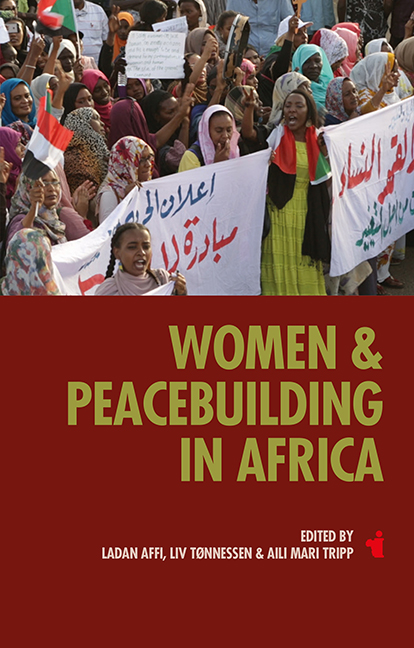Book contents
- Frontmatter
- Contents
- List of Illustrations
- Notes on Contributors
- Acknowledgement
- Abbreviations
- Maps
- 1 Introduction: The Gendering of Peacebuilding in Africa
- 2 Women Activists’ Informal Peacebuilding Strategies in South Sudan
- 3 ‘Ba Sa Jin Mu’ (They Don’t Listen to Us): Women and Peacebuilding in North-Eastern Nigeria
- 4 No Going Back: Somali Women’s Fight for Political Inclusion
- 5 Sudanese Women’s Demands for Freedom, Peace, and Justice in the 2019 Revolution
- 6 The Fight for Democracy and Women’s Rights in Algeria: A Long Legacy of Struggle
- 7 Conclusions: Women’s Peace Activism in Africa
- Bibliography
- Index
3 - ‘Ba Sa Jin Mu’ (They Don’t Listen to Us): Women and Peacebuilding in North-Eastern Nigeria
Published online by Cambridge University Press: 26 May 2022
- Frontmatter
- Contents
- List of Illustrations
- Notes on Contributors
- Acknowledgement
- Abbreviations
- Maps
- 1 Introduction: The Gendering of Peacebuilding in Africa
- 2 Women Activists’ Informal Peacebuilding Strategies in South Sudan
- 3 ‘Ba Sa Jin Mu’ (They Don’t Listen to Us): Women and Peacebuilding in North-Eastern Nigeria
- 4 No Going Back: Somali Women’s Fight for Political Inclusion
- 5 Sudanese Women’s Demands for Freedom, Peace, and Justice in the 2019 Revolution
- 6 The Fight for Democracy and Women’s Rights in Algeria: A Long Legacy of Struggle
- 7 Conclusions: Women’s Peace Activism in Africa
- Bibliography
- Index
Summary
Northern Nigeria, where the insurgent radical Islamist group Boko Haram has killed thousands of people, is a context where conflict strongly shapes women's mobility, leadership, and rights. Women in northern Nigeria face the additional challenges of conservative gender ideologies and exclusion from formal peace processes and postconflict governance arrangements. This is despite the efforts of women peace activists in developing the National and State Action Plans, which follow UNSCR 1325 and related resolutions. Nonetheless, women engage in unrecognised or informal forms of peacebuilding. By calling it informal peacebuilding, we acknowledge women's exclusion from political power, which pushes them into and restricts them to informal spheres of activism. In northeastern Nigeria, women's role in peacebuilding is usually less obvious because it is intertwined with everyday life. This chapter looks at research through the primary lens of activist-researchers with internally displaced women in Borno State of north-east Nigeria. IDP women are seldom if ever considered as actors and more commonly thought of only as victims. The chapter examines how Nigerian women's rights and peace organisations and networks have collaborated across political, ethnic, religious, and other differences and have brought a gendered lens to bear on peacebuilding.
The insurgency of the Jama’atu Ahlis Sunnah Lida’awati Wal Jihad, more commonly known as Boko Haram, is an Islamist group based in northern Nigeria that is also active in Cameroon, Chad, and Niger. Conflictrelated deaths in north-east Nigeria are estimated at over 35,000 between 2011 and 2018 alone, over 18,000 of which are due to terrorist attacks. The Global Terrorism Index further reports that Boko Haram is one of the four deadliest terrorist groups in the world over the past 15 years and the deadliest in Africa (Institute for Economics and Peace 2019), even with its split into several factions since the upsurge of conflict in 2009 and a decline in terrorist activity since its peak in 2014. Despite military offences in 2015–16 that reclaimed territory, Boko Haram continues its terrorist attacks, including ‘suicide’ bombings; attacks on villages, convoys, and the military; and kidnappings of civilians. Between January and August 2020, there were at least 13 such attacks, with hundreds killed and many more wounded (the Counter-Extremism Project 2020).
- Type
- Chapter
- Information
- Women and Peacebuilding in Africa , pp. 53 - 78Publisher: Boydell & BrewerPrint publication year: 2021



